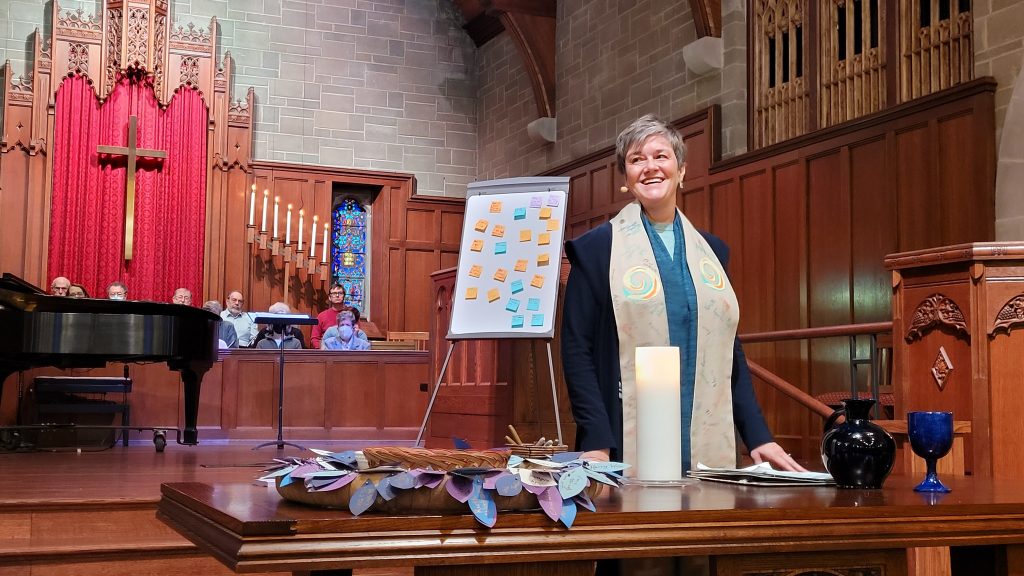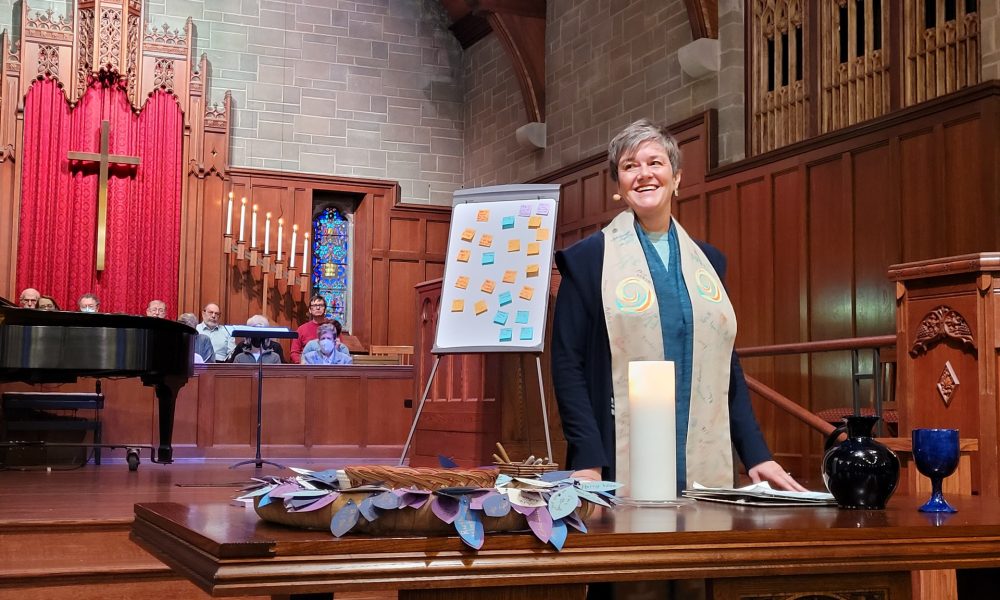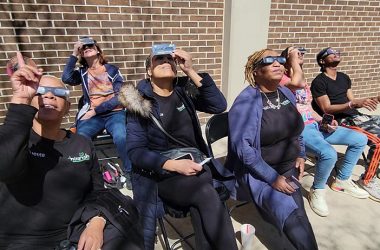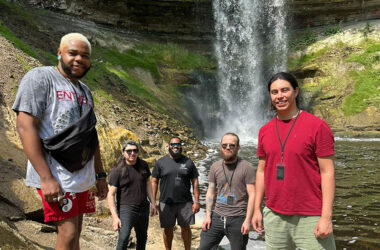
(This story is the second in the Chronicle’s State of Faith series exploring spiritual life in the Homewood and Flossmoor area. The project is funded by a grant from the Homewood Rotary Club.)
Founded in 1927, Flossmoor Community Church is approaching its 100th anniversary of serving its members and the wider area.
In addition to welcoming its members for Sunday services and ministry groups, FCC also hosts meetings and events for local organizations such as You Matter 2, The Center for Food Equity in Medicine, Homewood Stories, Girl Scouts and Alcoholics Anonymous.

The church also hosts fun community events including a PRIDE party, fall festival and BYOB Bingo, as well as more solemn occasions such as vigils, peace talks and community forums.
Betsy Hanzelin, executive director of church ministries, started attending FCC with her family as a sixth-grader. She has worked at the church for 30 years, starting as Youth Minister in 1992.
Hanzelin talked about the church’s beliefs and evolution as a destination for Christians in H-F and beyond.
H-F Chronicle: You recently debuted a new logo, which bolds the word “community.” Was that intentional?
Betsy Hanzelin: The old logo was stale and frankly too “churchy.” With the new design, we really wanted to stress that “community” part. Our name is Flossmoor Community Church. We feel strongly that we have a call to serve the community we’re in.
We created this community that loves and cares for one another because we’re loved by a God who cares for us.
We’re included and accepted for who we are, even in the midst of us not being great people sometimes.
Our world in general is not built on forgiveness. It’s hard for us to forgive others and ourselves. We’re a school of forgiveness. Having this example of faith, learning who Jesus was and what forgiveness means, it helps us build those muscles.
Many houses of worship experienced fluctuating membership since COVID. How are FCC’s current membership numbers?
Our numbers for 2022 showed an increase in membership for the first time in many years. We also have an increase in visitors, many of them from outside the immediate area.
These signs feel like a positive pattern as we continue to emerge from the pandemic, and as our pastor, Rev. Julie Van Til, begins to really know and inspire our congregation to imagine what we are called to do for our greater community.
As a church in our community, we want all churches to survive and thrive. We don’t want to see drops in numbers of churches. There’s no joy in that; we’re all saddened by that.
Sometimes we get folks at FCC who are leaving some of those churches. We are sad if (it’s) because there’s a lack in the other church. It makes us wonder how we can be supporting each other a little more.
What are some of the reasons people visit and join FCC, including from other churches?
Families who visit now and join typically are looking for open and affirming churches, especially families of the LGBTQIA community.
Here (at FCC) are people who are trying to walk the walk, not just writing checks. We’re speaking out against racism. We’re fighting for the environment. People are attracted to the sense of social justice, openness and equality that we’ve been working on for the past few years.
A lot of people have been hurt by church, especially those in the LGBTQ community. People in politics have used church to hurt people. We’ll hear people say, “I went to gaychurch.org and looked for a church that’s open and affirming. I saw you guys, and wanted to find out more.”
I’ve had kids at church come out to me because it was a safe place for them to do that.
How has FCC engaged in larger community conversations about the world?
Everyone is so afraid of being political. The problem with that is — Jesus was a political person. He wasn’t partisan, of course. What Jesus talked about, the Gospel, is about how everyone is included at the table. Everyone is welcome. You don’t get to judge your neighbor.
Certainly our role is ask ourselves: “Is what’s happening in the world lining up to what the Gospel wants from us?” That’s the stuff that’s going to keep all churches alive.
Our church not being affiliated with any denomination has allowed us to provide space for people to come together and have difficult conversations. With the blackface issue (when a video surfaced in 2019 of Homewood-Flossmoor High School students in blackface) – local groups came to ask if they could use our space.
Even with the situation in Flossmoor with (the police killing of) Madeline Miller, we asked, “Do we need to open a space for community conversation that can’t happen at the village board meeting?”
How did the pandemic affect member giving over the past few years?
We were able to stay consistent and even go up in 2021. PPE loans for churches were helpful for holding things together. Our pledge numbers were consistent, and our average number per pledge.
There’s a difference in giving patterns these days. In the older days, we had members who wrote big checks to the church. We didn’t have to do the fundraising that we do now. We also serve people of all different socioeconomic statuses, more so than we used to.
We have older people who have been in the church their whole life, who understand the need for stewardship and giving, and maybe they’re able to give a bit more. A younger family with two little children who are just starting out, they can’t give at the same level.
For every long-term member, it takes five new families to meet that same level of giving.
There are also more options in the world to give to, and churches aren’t as central to people’s lives as they were growing up.





